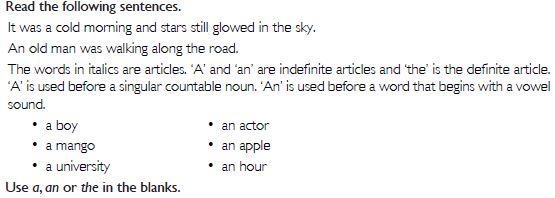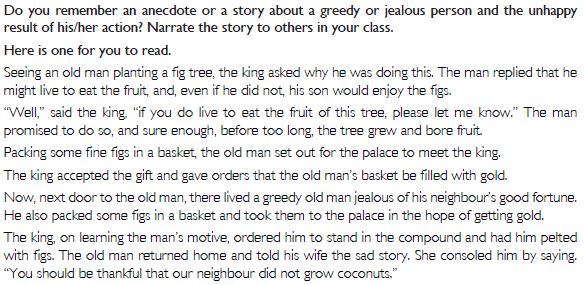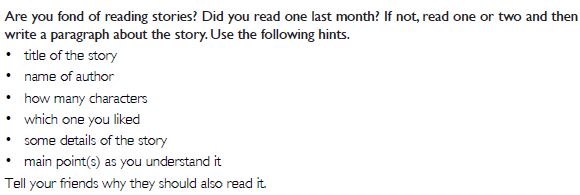Question 1:
Why did the neighbours kill the dog ?
Answer:
The neighbours (the greedy couple) wanted the dog to find them gold. But the dog showed them the spot where a dead kitten lay buried. In a fit of anger, they killed the dog.
Question 2:
The old farmer and his wife loved the dog:
Answer:
as if it were their own baby and as they were kind to all living beings
Question 3:
When the old couple became rich, they:
Answer:
lived comfortably and were generous towards their poor neighbours.
Question 4:
The greedy couple borrowed the mill and the mortar to make:
Answer:
a pile of gold
Question 5:
The old farmer is a kind person. What evidence of his kindness do you find in the first two paragraphs ?
Answer:
The old farmer had a dog named Muko. He loved it like his own baby. He fed the dog with small pieces of fish and boiled rice. He was patient and kind to all living things. This shows that the old farmer was a kind person.
Question 6:
What did the dog do to lead the farmer to the hidden gold
Answer:
The dog went running to the farmer. He put his paws against his legs and motioned with his head to some spot. It was the place where the gold was hidden.
Question 7:
How did the spirit of the dog help the farmer first?
Answer:
First, the spirit of the dog helped the farmer get a tub full of gold.
Question 8:
How did it help him next?
Answer:
Next, the spirit dog came in the farmer’s dream and told him to collect ashes that would make any withered tree bloom. When the procession of the daimio passed by their village, farmer made a dry cherry tree burst into blossom by scattering pinches of ash on the tree. The farmer was richly rewarded for this wonderful act.
Question 9:
Why did the daimio reward the farmer but punish his neighbour for the same act?
Answer:
The wicked farmer tried to do the same act by throwing a handful of ash over daimio and his procession. However this time the particle did not transform the withered tree. Instead the wind blew the fine dust in the nose and eyes of the daimio and his wife who started sneezing and choking. It spoiled all the pomp and dignity of the procession. The guard dragged the wicked man and beat him to death.
Question 10:
Write appropriate question words in the blank spaces in the following dialogue.
Neha:
________________ did you get this book?
Sheela: Yesterday morning.
Answer:
When
Question 11:
Write appropriate question words in the blank spaces in the following dialogue.
Neha:
________________ is your sister crying?
Sneela: Because she has lost her doll.
Answer:
Why
Question 12:
Write appropriate question words in the blank spaces in the following dialogue.
Neha:
________________ room is this, yours or hers?
Sneela: It’s ours.
Answer:
Whose
Question 13:
Write appropriate question words in the blank spaces in the following dialogue.
Neha:
________________ do you go to school?
Sneela: We walk to school. It is near by.
Answer:
How
Question 14:
My friend lost his chemistry book. Now he doesn’t know _______ to do and _______ to look for it.
Answer:
what, where
Question 15:
There are so many toys in the shops. Neena can’t decide ________ one to buy.
Answer:
which
Question 16:
You don’t know the way to my school. Ask the policeman ________ to get there.
Answer:
how
Question 17:
You should decide soon ________ to start building your house.
Answer:
when
Question 18:
Do you know ________ to ride a bicycle ? I don’t remember ________ and ________ I learnt it.
Answer:
how, when, where
Question 19:
“You should know ________ to talk and ________ to keep your mouth shut,’’ the teacher advised Anil.
Answer:
when, when
Question 20:
Add im– or in– to each of the following words and use them in place of the italicised words
in the sentences given below.

Answer:
The project appears impossible at first sight but it can be completed if we work very hard.
Question 21:
Add im– or in– to each of the following words and use them in place of the italicised words
in the sentences given below.

Answer:
The project appears impossible at first sight but it can be completed if we work very hard.
Question 22:
Add im– or in– to each of the following words and use them in place of the italicised words
in the sentences given below.

Answer:
He is incompetent. That’s why he can’t keep any job for more than a year.
Question 23:
Add im– or in– to each of the following words and use them in place of the italicised words
in the sentences given below.

Answer:
Don’t be impatient. Your letter will come one day,” the postman told me.
Question 24:
Add im– or in– to each of the following words and use them in place of the italicised words
in the sentences given below.

Answer:
That’s an improper remark to make under the circumstances.
Question 25:
Add im– or in– to each of the following words and use them in place of the italicised words
in the sentences given below.

Answer:
He appears to be insensitive. In fact, he is very emotional.
Question 26:

Answer:
a
Question 27:

Answer:
A
Question 28:

Answer:
the
Question 29:

Answer:
an
Question 30:

Answer:
a
Question 31:

Answer:
the
Question 32:

Answer:
the
Question 33:

Answer:
the
Question 34:

Answer:
a
Question 35:

Answer:
the
Question 36:

Answer:
the
Question 37:

Answer:
the
Question 38:

Answer:
the
Question 39:

Answer:

Question 40:
Put each of the following in the correct order. Then use them appropriately to fill the
blanks in the paragraph that follows. Use correct punctuation marks.
English and
Hindi/both/in/he writes
and only/a few short stories/many books in English/in Hindi
is/my Hindi/than my English/much better
Ravi Kant is a writer, and __________________.
Of course, he is much happier writing in English than in Hindi. He has written
_______________. I find his books a little hard to understand. ___________________.
Answer:
he writes both in English and Hindi.
many books in English and only a few short stories in Hindi.
my Hindi is much better than my English.
Paragraph
Ravi Kant is a writer and he writes both in English and Hindi. Of course he is much happier
writing
in English than in Hindi. He has written many books in English and only a few short stories
in Hindi. I
find his books a little hard to understand as my Hindi is much better than my English
Question 41:

Answer:
The Coward’s Way
The story ‘The Coward’s Way’ reveals the truth that a coward is not
always a coward. He can perform acts of bravery which even a brave person would be afraid of
performing. The story is written by R. Venugopal Reddy and it has three main characters—Mr
Das, his son and the doctor.
Mr Das was a born coward. He was married to a good woman
who made his life quite happy and helped him forget about his fear for some time. A son was
also born to them. One day his wife was attacked by plague. Cowardice again overpowered Mr
Das. He ran away with his son from the house lest the fatal disease should catch him. The
next morning he came to know that his wife was dead. It was a great shock to him. Then a
horrible idea struck him. He feared that his son might inherit his cowardice. So he sought
the help of a doctor. The latter tried to soothe him as much as he could. But what a pity
that he lost his son too in a car accident ! The incident almost maddened him. The doctor
consoled him and tried his best to pacify him. One day he took him out for a long walk. They
were walking by a railway line. They saw a woman and her child lying on the lines. The
running train was not far off. The doctor stood there, petrified with fear. But what
happened next surprised the doctor. Mr Das jumped up in front of the approaching train in a
flash and saved the woman and her child. But he himself was badly wounded. Before he died,
he muttered feebly, ‘‘I did it, doctor. I go to my Maker with a clean slate.’’
It was
really a brave act. The story gives us a great lesson. So we must read it.
